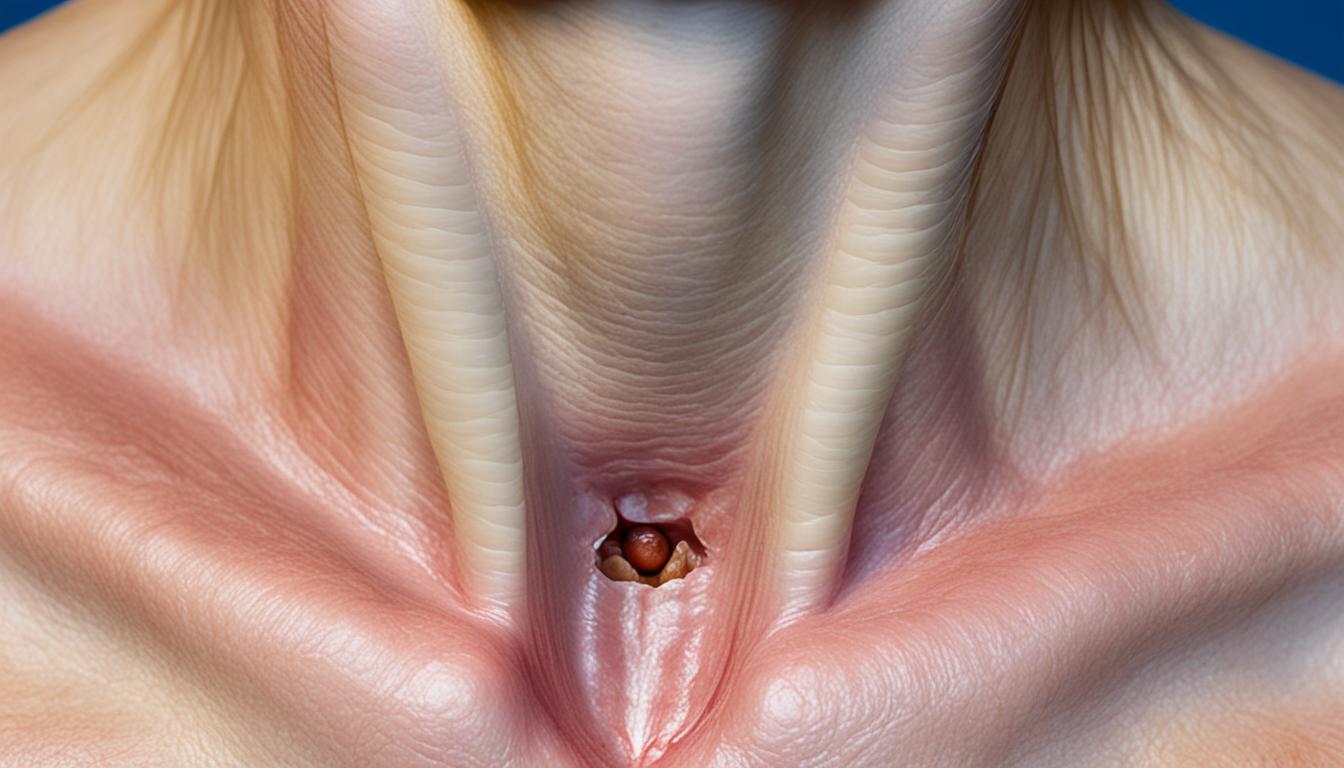Thyroid gland enlargement is also referred to as a goiter. This makes the thyroid, which is located at the neck’s base, grow bigger. It happens due to factors like our genes, infections, too much radiation, and even stress.
Doctors diagnose it using specific tests like TSH, T-4, and checks for antibodies. Right now, the ways to treat this are few. But, there’s hope in stem cell therapy for handling this condition.
Key Takeaways:
- Thyroid gland enlargement, also known as goiter, is a condition where the thyroid gland becomes enlarged.
- Causes of thyroid gland enlargement include genetics, infections, radiation, and stress.
- Diagnosis involves tests such as TSH, T-4, and antibodies tests.
- Current treatments for thyroid gland enlargement are limited.
- Stem cell therapy shows promise as a potential treatment option.
Symptoms and Diagnosis of Thyroid Gland Enlargement
The thyroid gland may grow bigger than normal, causing a goiter. This can make it hard to breathe, swallow, or talk. With a underactive thyroid, people may notice dry skin, hair loss, and feel less desire for love. They might also have strange or missed periods and find it hard to go to the bathroom. On the flip side, an overactive thyroid can make the heart beat faster, cause weight loss, excessive sweating, and feelings of being too scared or worried.
Doctors use several tests to check for thyroid gland enlargement. A TSH test looks at the level of thyroid-stimulating hormone in the blood. The T-4 test measures the key thyroid hormone. And the antibodies test checks for special proteins that might affect how well the thyroid works.
Symptoms of Thyroid Gland Enlargement
- Goiter (enlarged thyroid gland)
- Difficulty in breathing, swallowing, or speaking
- Dry skin
- Hair loss
- Decreased libido
- Irregular menstrual cycles
- Constipation
- Increased heart rate
- Weight loss
- Sweating
- Anxiety
Diagnosis of Thyroid Gland Enlargement
Doctors might do the following tests to find out if a person has a thyroid gland that’s too big:
- TSH test: This blood test measures the levels of thyroid-stimulating hormone, showing how the thyroid works.
- T-4 test: It measures the levels of the main thyroid hormone, giving more details about the thyroid’s performance.
- Antibodies test: This one looks for antibodies linked to thyroid problems, like autoimmune conditions.
Getting the right tests is essential to pinpoint the issue and decide on the best care plan.
Stem Cell Therapy for Thyroid Gland Enlargement
Stem cell therapy is a new area of study focused on treating enlarged thyroid glands. It looks into the use of different stem cell types like MSCs, ESCs, and RSCs. These cells are known for their ability to regenerate tissues and affect the immune system.
Research has shown that MSC transplants might help by adjusting how Th17 and Treg cells interact. This could help lower the levels of thyroid autoantibodies. MSCs are also good at repairing tissues and changing the immune system. This might lead to less damage on the thyroid and better thyroid function.
This research brings hope to those with big thyroid glands. It aims to use stem cells’ healing power to fix the thyroid. This could make the symptoms of a big thyroid go down.
The Role of Mesenchymal Stem Cells (MSCs)
Mesenchymal stem cells show promise for treating thyroid gland issues. They can turn into different cells, including ones in the thyroid. Their ability to heal and adjust the immune system is key.
Exploring Embryonic Stem Cells (ESCs) and Organ Resident Stem Cells (RSCs)
Scientists are also looking at ECSs and RSCs. ESCs can become many types of cells, including thyroid ones. This healing ability is exciting for fixing damaged thyroid tissue.
RSCs, inside the thyroid, can also help. They naturally work on repairing and keeping thyroid tissue healthy. This makes them a potential part of future treatments.
Stem cell therapy is getting more attention as we learn more about it. Yet, we still need more studies. This is to see how safe and effective it really is for treating big thyroids.
Using different stem cells offers a range of treatment options for thyroid issues. They target both the need for healing and changing the immune system. This approach aims to directly fix the thyroid’s problems and help people feel better.
Conclusion
Goiter is a common health problem that enlarges the thyroid gland. It can lead to various symptoms and mess with thyroid hormone levels. Right now, treating goiter isn’t easy. But, there’s new hope because of stem cell therapy.
In some studies, stem cells have shown they can help repair tissues and work with the body’s immune system. This means they could improve how we treat and deal with goiter.
Still, we need more research and tests to know if using stem cells on goiter is effective and safe. But, the idea itself is very exciting. If it works, stemming from stem cells, we might have new and better ways to treat goiter.

